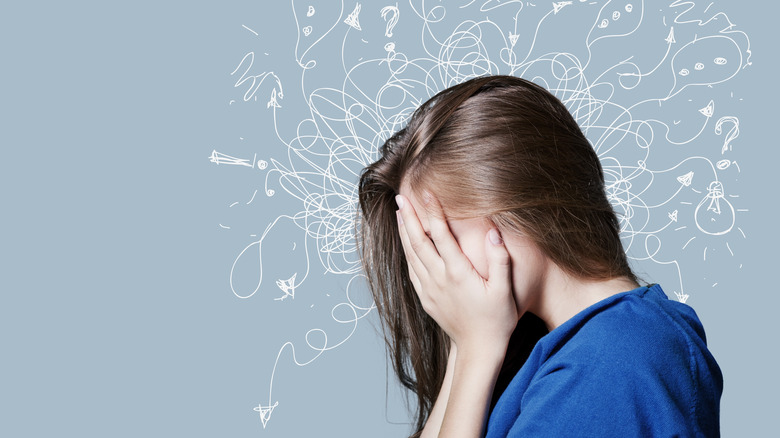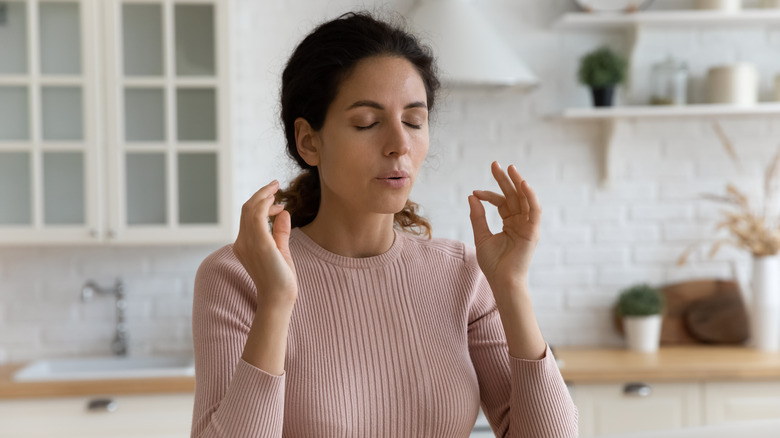ADHD Signs That Present Differently In Women
According to a 2021 study published in Neuroscience & Biobehavioral Reviews, 2.5% of adults are affected by ADHD (attention deficit hyperactivity disorder) and, per a 2017 study in BMC Psychiatry, up to 50% of adults who have ADHD also have some type of anxiety disorder. Mindbodygreen defines ADHD as a neurodevelopmental disorder. While it's commonly developed throughout childhood or teenage years, it might fail to go diagnosed until adulthood.
Though the core aspects of ADHD involve not being able to pay attention, hyperactivity, and impulsivity, symptoms can vary greatly from one individual to the next. For some people, it appears as excessive fidgeting while others may consistently find themselves daydreaming. Dr. Russell Barkley told Mindbodygreen that a lot of adults with ADHD struggle with organizing their thoughts, properly managing their time, meeting deadlines, and regulating emotions. A diagnosis depends on the types of symptoms being displayed. For women, however, symptoms may show up a bit differently.
Risks of failing to recognize ADHD in girls
According to the American Psychological Association (APA), many women with ADHD aren't diagnosed until their late 30s or 40s. In October 2002, psychologist Stephen P. Hinshaw published two studies on girls with ADHD. He was one of the first psychologists to study girls specifically. Prior studies on ADHD typically focused on symptoms found in boys and used those as markers as indications of ADHD for both boys and girls.
Psychologist Kathleen Nadeau said that missing signs of ADHD in girls and letting them go untreated can lead to chronic low self-esteem, underachievement, anxiety, depression, teen pregnancy, and early smoking. As adults, women with undiagnosed ADHD are at risk of divorce, financial crises, single-parenting a child with ADHD, not graduating from college, underemployment, substance misuse, eating disorders, and constant stress brought on by the difficulty of managing daily life.
In addition, women who don't find out they have ADHD until adulthood often blame themselves when bad things happen, feel powerless, and have a history of depression or anxiety.
Women with ADHD typically have the inattentive type
According to Mindbodygreen, there are three types of ADHD: inattentive type, hyperactive-impulsive type, and combined type. In order to receive an ADHD diagnosis, you must have experienced at least five inattentive and/or hyperactive-impulsive symptoms, with significant symptoms emerging before the age of 12. Dr. Uma Naidoo, author and Harvard-trained nutritional psychiatrist, told Mindbodygreen that for girls and women, ADHD usually shows up as "lower severity but more pervasive inattention and hyperactivity." Girls who have the inattentive type typically aren't as disruptive as boys, which is one reason it goes unnoticed or misdiagnosed. Being unorganized, quickly feeling overwhelmed, or lacking effort and motivation are signs of ADHD often present in women.
The older girls become, the more obvious the ADHD becomes and it's likely made more apparent by a major life change or stressful event. Switching careers, having a baby, getting married or divorced, or living through a pandemic can all intensify ADHD symptoms to the point that coping mechanisms developed over the years no longer help.
Women are more likely to internalize symptoms of ADHD
Dr. Naidoo told Mindbodygreen that women with ADHD are more likely to embody symptoms of low self-esteem, anxiety, and depression. For women with hyperactivity, this can manifest as feeling overwhelmed. This could be due to biology or pressure from society to be polite, quiet, and nice.
With this in mind, emotional regulation can also be a struggle for women with ADHD. Though the DSM-5 criteria have yet to fully acknowledge this aspect of ADHD in women, developing a better understanding of it can help minimize the risk of misdiagnosis. Women with ADHD are often told they have depression or borderline personality disorder. Dr. Lidia Zylowska, an author and psychiatrist at the University of Minnesota Medical School, said that "Things like intense impulsive emotional outbursts of anger can be common, along with rejection sensitivity, in which you spiral into feeling bad about yourself in situations where you sense rejection from another person."
Lifestyle habits can impact ADHD
According to Mindbodygreen, research suggests certain factors can make ADHD symptoms worse. Not getting enough sleep is one of them. Insufficient sleep habits can lead to issues with executive functions that people with ADHD already struggle with tackling. Poor stress management can also be a contributing factor, especially because executive function is already taxed by ADHD.
Poor gut health has also been linked to ADHD, as healthy gut bacteria help synthesize precursors for dopamine and other neurotransmitters. Gluten, dairy, artificial food colors, and additives can also contribute to ADHD symptoms. Moreover, if you're not getting an adequate amount of zinc, vitamin D, iron, or magnesium, those deficiencies could cause hyperactivity.
Unbalanced blood sugar can also play a role in ADHD symptoms, particularly when it drops too low. Integrative psychiatrist Ellen Vora tells Mindbodygreen that blood sugar can dip when you skip meals and if you eat a meal with lots of sugar or refined carbs.
Though research is still developing, being exposed to heavy metals and mold toxins may have some association with ADHD, per Mindbodygreen.
Natural ways to treat ADHD symptoms
While there's no shame in taking medications and, in many cases, they're the best option depending on the severity of the symptoms, Mindbodygreen recommends several natural strategies for managing ADHD.
Dr. Vora told Mindbodygreen that sleep is the number one most important factor. Try to get 7 to 9 hours of sleep and develop a habit of going to bed and getting up at the same time. In fact, implementing routines whenever possible is ideal for people with ADHD.
Exercising can help curb stress and anxiety, help you sleep more soundly, reduce impulses, improve executive functions, and increase brain proteins needed for learning and memory.
Trying the Mediterranean diet is also recommended as it supports mental and cognitive health. Eating plenty of healthy fats and plant-based foods that are rich in vitamins, minerals, and polyphenols is important for your neurotransmitters. It may also be helpful to eliminate gluten, dairy, and artificial colors and flavors, especially if you have digestive issues.
Other helpful habits include embracing mindfulness, implementing the Pomodoro method (in which you work on one task for 25 minutes, take a 5-minute break, and repeat), and trying cognitive-behavioral therapy (CBT) or ADHD coaching.






